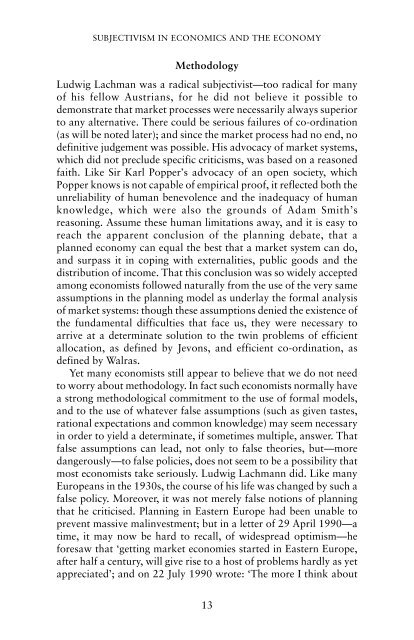Subjectivism and Economic Analysis: Essays in memory of Ludwig ...
Subjectivism and Economic Analysis: Essays in memory of Ludwig ...
Subjectivism and Economic Analysis: Essays in memory of Ludwig ...
You also want an ePaper? Increase the reach of your titles
YUMPU automatically turns print PDFs into web optimized ePapers that Google loves.
SUBJECTIVISM IN ECONOMICS AND THE ECONOMYMethodology<strong>Ludwig</strong> Lachman was a radical subjectivist—too radical for many<strong>of</strong> his fellow Austrians, for he did not believe it possible todemonstrate that market processes were necessarily always superiorto any alternative. There could be serious failures <strong>of</strong> co-ord<strong>in</strong>ation(as will be noted later); <strong>and</strong> s<strong>in</strong>ce the market process had no end, nodef<strong>in</strong>itive judgement was possible. His advocacy <strong>of</strong> market systems,which did not preclude specific criticisms, was based on a reasonedfaith. Like Sir Karl Popper’s advocacy <strong>of</strong> an open society, whichPopper knows is not capable <strong>of</strong> empirical pro<strong>of</strong>, it reflected both theunreliability <strong>of</strong> human benevolence <strong>and</strong> the <strong>in</strong>adequacy <strong>of</strong> humanknowledge, which were also the grounds <strong>of</strong> Adam Smith’sreason<strong>in</strong>g. Assume these human limitations away, <strong>and</strong> it is easy toreach the apparent conclusion <strong>of</strong> the plann<strong>in</strong>g debate, that aplanned economy can equal the best that a market system can do,<strong>and</strong> surpass it <strong>in</strong> cop<strong>in</strong>g with externalities, public goods <strong>and</strong> thedistribution <strong>of</strong> <strong>in</strong>come. That this conclusion was so widely acceptedamong economists followed naturally from the use <strong>of</strong> the very sameassumptions <strong>in</strong> the plann<strong>in</strong>g model as underlay the formal analysis<strong>of</strong> market systems: though these assumptions denied the existence <strong>of</strong>the fundamental difficulties that face us, they were necessary toarrive at a determ<strong>in</strong>ate solution to the tw<strong>in</strong> problems <strong>of</strong> efficientallocation, as def<strong>in</strong>ed by Jevons, <strong>and</strong> efficient co-ord<strong>in</strong>ation, asdef<strong>in</strong>ed by Walras.Yet many economists still appear to believe that we do not needto worry about methodology. In fact such economists normally havea strong methodological commitment to the use <strong>of</strong> formal models,<strong>and</strong> to the use <strong>of</strong> whatever false assumptions (such as given tastes,rational expectations <strong>and</strong> common knowledge) may seem necessary<strong>in</strong> order to yield a determ<strong>in</strong>ate, if sometimes multiple, answer. Thatfalse assumptions can lead, not only to false theories, but—moredangerously—to false policies, does not seem to be a possibility thatmost economists take seriously. <strong>Ludwig</strong> Lachmann did. Like manyEuropeans <strong>in</strong> the 1930s, the course <strong>of</strong> his life was changed by such afalse policy. Moreover, it was not merely false notions <strong>of</strong> plann<strong>in</strong>gthat he criticised. Plann<strong>in</strong>g <strong>in</strong> Eastern Europe had been unable toprevent massive mal<strong>in</strong>vestment; but <strong>in</strong> a letter <strong>of</strong> 29 April 1990—atime, it may now be hard to recall, <strong>of</strong> widespread optimism—heforesaw that ‘gett<strong>in</strong>g market economies started <strong>in</strong> Eastern Europe,after half a century, will give rise to a host <strong>of</strong> problems hardly as yetappreciated’; <strong>and</strong> on 22 July 1990 wrote: ‘The more I th<strong>in</strong>k about13

















